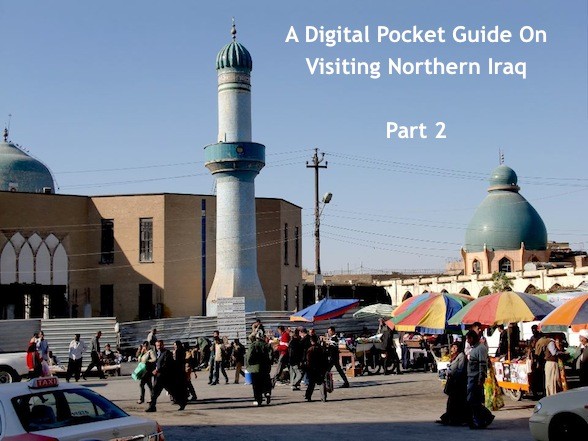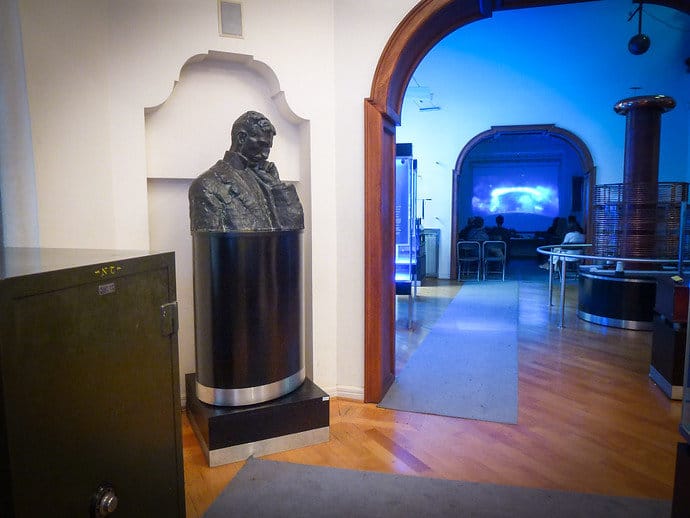In Part 1 of A Digital Pocket Guide On Northern Iraq, you learned that the KRG-controlled north is relatively safe, to bring your cash, and where to start looking for a place to sleep.

Now that you’ve laid down the foundations for a trip to Iraq, you’re ready see the unexpected sights and work your way through many-a-checkpoint.
Shared Taxis Through Checkpoints, Checkpoints…And More Checkpoints
Unless you take a flight from Arbil to Sulaymaniyah, moving between northern Iraqi cities requires making use of shared taxis. (Though yes, there are still other ways.) Shared taxis are basically that – a taxi 1-4 people share and split the cost of – to get from one city to another. The average cost, assuming 4 people in the car, between Arbil and Sulaymaniyah is 20,000 Iraqi dinar (~$20) to give you an idea.

 Waiting In Garages – Every city has a main garage for shared taxis between cities. Where a given car is going will be loudly announced and they’re lined up by destination. You’ll have to wait around for about 10-15 minutes hoping the car fills up with other passengers, otherwise you’ll be off with a higher rate.
Waiting In Garages – Every city has a main garage for shared taxis between cities. Where a given car is going will be loudly announced and they’re lined up by destination. You’ll have to wait around for about 10-15 minutes hoping the car fills up with other passengers, otherwise you’ll be off with a higher rate.- Checkpoints – You will go through several checkpoints on any given trip. An off-hand calculation would be about 1 per 45 minutes if not more. Cars are inspected often, occupants required to get out, and passports checked at these heavily armed checkpoints.
- Questioning – It’s also not uncommon to be questioned at checkpoints depending on your nationality. Your intentions and reasons for traveling in northern Iraq will be the primary focus; expect much more scrutiny if you have an Arabic surname.
It’s also a good idea to note the route a given shared taxi will take. Many direct routes leave the KRG-controlled areas and skim the borders for legs of the trip. While you can pay (3-4 times) more to stay within the borders of KRG-Iraq; which is considered safer, the extended drive time might not be worth the unquantifiable amount of added protection.
What To See And Do In Northern Iraq
Being a large geographic area, this is a section that really deserves to be its own (or several) posts. That said, most travelers will only have 10 days in the area and it may help you to plan your sightseeing around these particular experiences.

- Walk Around The Arbil Citadel – Sitting more than 30 meters above the rest of the city you can meander around this ghost town with great views of below.
- Ankawa In Arbil – The Assyrian/Christian district in the city is quite active at night.
- Deutscher Hof Erbil – Entering this German restaurant located on the site of an old United Nations (UN) base in Arbil is surreal.
- Halabja Memorial – Located in “old” Halabja (make this clear at the shared taxi garage) this memorial stands to recognize the thousands that were killed in a 1988 gas attack by Saddam Hussein. The Amna Suraka Museum in Sulaymaniyah also shows part of this dark history.
There are also the Gali Ali Bag waterfalls in the north, Sulaymaniyah’s bazaars and parks, and my personal favorite for free wi-fi and relaxation, the Shawany Maliek Cafeteria shisha cafe in that same city.
Looking For Food In Northern Iraq
Many of you asked about the food in northern Iraq and when it comes to eating out, things vary widely between cities. Most budget travelers looking for a bite in Arbil will be hard pressed to find anything more convenient than plentiful doner kebab and falafel sandwiches. While there are restaurants with a bit more variety in and around town, the culture of eating out isn’t quite in place yet.

Th e cuisine in Sulaymaniyah was much more varied; although admittedly it’s difficult to ascertain what’s local to such a cosmopolitan city.
e cuisine in Sulaymaniyah was much more varied; although admittedly it’s difficult to ascertain what’s local to such a cosmopolitan city.
Keep in mind that in northern Iraq, places to eat close down fairly early (around 7pm). For those of you who like to snack however, finding a corner store at most hours of the night won’t be tough at all.
Finally, alcohol is readily available and for sale at a number of liquor stores and small shops around the major cities. The prices, rather surprisingly, are incredibly cheap with major brand bottles of vodka and whiskey for sale from $5-15 and beer for about $1 a bottle.
Basic Travel Safety
Most of the safety questions about traveling in northern Iraq revolve around the violence associated with the country in general. However, in terms of general safety, scams, and street crime, it’s far and few between. In fact, one surprising thing was how consistent the prices I was quoted were. From meter-less taxis, hotels, and markets, none of the prices were above and beyond what I was told they should have been. The streets at night, although quiet, were peaceful and was told as much by everyone I encountered.

In fact, if you were just to fly into Arbil, or be dropped off in the center of Sulaymaniyah, you wouldn’t even realize the instability of war was so recent. The checkpoints and border controls are the few obvious signs of a war zone that’s right outside. Inside, all you see is that the Kurdistan-controlled north is looking forward – even if it’s still got a way to go in terms of tourism.
This Is Only A Rough Start
Such a large and complex area can’t be covered in a single post or two, but this digital pocket guide should get you off to a good start if you’ve ever considered traveling to Iraq (or are now!) It’s not the most straightforward place to navigate – which might be appealing to many travelers looking for a trail that’s not yet well worn.












Awesome article…wow, you have me completely convinced. Now if only I could sell Shawna on the idea……
How are your chances looking?
I don’t think I will keep it a surprise until we are at the border. That should work…
LOL!
That is awesome. There really isn’t many articles out there of travel for Iraq. Keep them coming. One day I’ll make it out there.
Thanks Michael – wasn’t sure if it was Iraq overload 🙂 Have several more lined up over the coming weeks.
Excellent Anil! So chock full of valuable information. I wonder your opinion about whether it would be safe for a solo female traveler to go to northern Iraq?
I don’t think being a woman would change the dynamic, in terms of safety, much at all for you in northern Iraq. Certainly in Arbil and Sulaymaniyah there were many, many more men on the streets than women so you might draw a bit more attention. Other than that there wouldn’t be much difference I’d say as far as the overall experience.
Thanks for sharing this and putting first-hand perspective on what it’s like traveling through this part of northern Iraq. I have to admit that I think the high frequency of checkpoints might leave me a bit frazzled. But, it sounds like they are handled professionally and efficiently. Glad to hear that you don’t think traveling as a woman would present any major problems.
It never felt as though we wouldn’t be let through, despite the visible and rather imposing fortification of each checkpoint.
Probably the biggest delay Earl and I encountered was when leaving the Kurdistan border for a bit and a guard who was convinced I was an Iraqi Arab. He was shouting in Arabic at me, with a few insults I’m guessing, but a prolonged blank face and a few minutes later we were off again.
Great guide Anil, how come restaurants close so early?
Thanks Sofia – to answer your question, I’m not sure. I’m guessing it’s partly due to the fact that most people don’t eat out there at all. No business after hours so perhaps no need to stay open. I’ll do some digging and see if I can find a better answer for you down the road though.
I detailed rundown indeed and appreciated as I seamlessly slip into a daydream of one day traveling to Iraq. Tweeted!
Very interesting and informative reading the writings of you and Earl about this journey.
You guys have provided a lot of great info. I am curious about the food. I am wondering how reasonably priced the fruit and vegetables are at the market (such as in the photo above). I’m not sure if it is local produce or not, which I know can dramatically affect price. The absurdity of produce costs here in Korea (in comparison to the US) has been quite a shock.
Also, aside from getting food from restaurants, are there grocery stores for you to get things to cook yourself?
Thanks
Thanks Ben. I’ve written a bit more about eating out in Iraq here:
http://www.foxnomad.com/2011/01/27/a-taste-of-eating-out-in-iraq/
and to answer your questions the produce prices were roughly consistent with what you’d find in southeastern and rural Turkey. (Not expensive for the staples – tomatoes, cucumber, beans, etc.) Whether it’s local or not I can’t say – I doubt it though since the climate and land isn’t very arable. It could be coming from further south in Iraq and Turkey as well to which the Kurdistan Regional Government has strong economic ties to.
There are a few grocery stores here and there – on the small side – but selling the essentials. Sulaymaniyah seemed to have many more of them then Arbil, which did not seem nearly as developed. You could get things to cook yourself like rice and produce but unless you’re staying in a home not have a place to cook it. There were no hostels or hotels with kitchens like you tend to find elsewhere in the world.
Hello guys
i life in erbil
if you guys are stuck just let me know i will help you out 🙂
have a great day
Cheers!